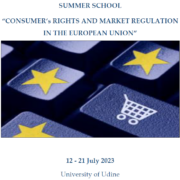[This post has been prepared by Ms. Francesca Albi, J.D. Candidate | Università degli Studi di Verona]
The Summer School on Transnational Litigation has been organized since 2019 within the Ravenna Program on Cross-Border Disputes by the University of Bologna, Department of Juridical Sciences – Ravenna Campus (Italy), under the direction of Prof. Michele Angelo Lupoi.
The organization of its 2023 edition confirms the success this projects continues to enjoy among participants from all over the world, who, over the years, are contributing to build a promising network of Private International Law enthusiasts. Indeed, this project has proven to be a building-bridges catalyst to connect people with the same interests in Private International Law issues: in this sense, this multi-year Summer School actively contributes to the sharing and spread of knowledges and views, which go beyond borders in every possible sense.
In 2023, the Summer School will take place from Monday 17 to Saturday 22 July, both in person at the Faculty of Law (Via Oberdan 1/2) in Ravenna – Italy, and online.
The title, which summarises the hot topics of the courses of this year’s edition, is “Cross-border litigation and international arbitration”. As a matter of fact, the themes dealt with will concern, on one hand, transnational litigation from a wide perspective (i.e., involving climate litigation, cross-border maritime litigation, family and succession Private International Law, civil and commercial litigation), and, on the other hand, the increasingly interesting matter of international arbitration. The full schedule of classes is available and may be downloaded at https://site.unibo.it/transnational-litigation/en/program.
Participants will have the outstanding opportunity to acquire specialised knowledges on these relevant topics of growing importance directly from experts in such matters. In fact, the faculty consists of renowned scholars and legal practitioners, who will offer their experience involving diverse professional backgrounds developed in different States over the world. In detail, the lecturers in this edition are (in alphabetical order) Apostolos Anthimos, Giovanni Chiapponi, Elena D’Alessandro, David Estrin, Marco Farina, Francesca Ferrari, Chris Helmer, Albert Henke, Emma Roberts, Marco Torsello, Stefano Alberto Villata and Anna Wysocka-Bar. Their biographies and professional experience may be consulted at https://site.unibo.it/transnational-litigation/en/faculty.
Registration to the School are now open!
In order to participate, some requirements should be met: applicants must be students or graduate students of a Bachelor (three-years) or Master (five-years) Degree (or equivalent under previous systems) in Law (LMG/01), Legal Services Science (L-14), Political and International Relationships Science (L-36), International Relationships (LM52), or Political Sciences (LM62). Other candidates may also be accepted upon the presentation of the CV which should be show a connection to the topics of the Summer School. Alongside students and post-grad students, also practitioners in legal matters are invited to participate. In this regard, it must be noticed that the Ravenna Bar Association will grant 20 formative credits to Italian lawyers who attend the Summer School.
Registration to the Summer School is possible upon the payment of a fee, whose amount is €250,00 and which does not cover expenses for the accommodation and meals (please, note that registration is considered completed only when the payment of the fee is fulfilled). Applications are open until 6 July 2023 (h 23.59 CET); it is not possible to apply beyond this deadline. The application procedure is described at https://site.unibo.it/transnational-litigation/en/fees-and-forms.
In this regard, it is worth mentioning that, in order to give to one deserving law student or law graduate, who meets specific age requirements, the opportunity to attend the Summer School online free of charge, a call for papers has been launched. It consists in the submission of an originally and previously unpublished paper on a topic concerning transnational litigation and international arbitration. A selection committee, composed by staff and faculty members of the Summer School, will evaluate the papers and will reward the author of the best one through the possibility to attend the full Summer School online without paying the ordinary registration fee. Moreover, the best three papers will be published in the Linkedin Newsletter of the Summer School on Transnational Litigation “Transnational litigation pills”. Every submission is truly appreciated. Detailed information on this call for papers may be found on the website of the Summer School, especially in the section “Fees and forms”.
For any question regarding the application process or logistics, the contact person is Dr. Cinzia Cortesi, Manager of Fondazione Flaminia (master@fondazioneflaminia.it; +39 0544 34345). Otherwise, in order to acquire further information on the project, courses and call for papers, it is possible to contact Prof. Michele Angelo Lupoi, Director of the Summer School (micheleangelo.lupoi@unibo.it) or Francesca Albi, Tutor (francesca.albi@unibo.it).
Further information may be found in the official website of the Summer School at https://site.unibo.it/transnational-litigation/en.
The organization team of the Summer School warmly invites everyone who meets the requirements listed above to apply for the 2023 edition courses, in order to allow as many people as possible the exciting chance to become part of a group of colleagues and friends with the common interest in Private International Law, that is larger and larger every year.





 Jürgen Basedow, a giant of private international law (and numerous other disciplines), has died – suddenly, and completely unexpectedly, on April 6. He was my teacher (though only briefly so in a formal position), my predecessor as director of the Hamburg Max Planck Institute (where he served as director 1997-2017) and my colleague as an emeritus. His (impressive) vita is still visible on the
Jürgen Basedow, a giant of private international law (and numerous other disciplines), has died – suddenly, and completely unexpectedly, on April 6. He was my teacher (though only briefly so in a formal position), my predecessor as director of the Hamburg Max Planck Institute (where he served as director 1997-2017) and my colleague as an emeritus. His (impressive) vita is still visible on the